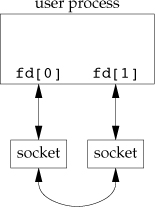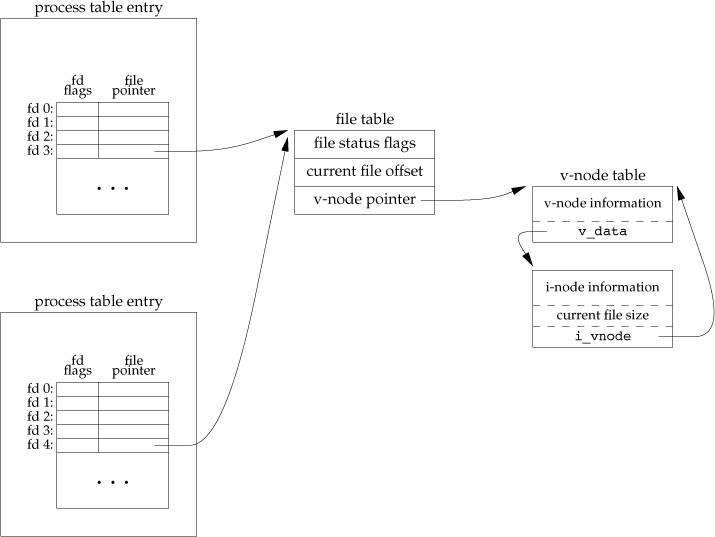COMS 4995 Advanced Systems Programming
Domain sockets
Summary of UNIX IPC so far
Shared memory
- Multiple threads in a single process
- Process address space is already shared among the threads
- But we still need synchronization (see below)
- Related processes (i.e., parent and child)
- Anonymous mmap: call
mmap()withMAP_SHARED | MAP_ANONYMOUSand pass -1 as file descriptor
- Anonymous mmap: call
- Unrelated processes
- File-backed mmap: call
mmap()withMAP_SHAREDand pass a valid file descriptor - File descriptor can be a real file returned by
open()or a virtual file returned byshm_open()
- File-backed mmap: call
Synchronization
- Multiple threads in a single process
- pthread mutex, condition variable, and reader-writer lock
- Multiple processes
- Shared memmory required:
- Unnamed POSIX semaphore:
sem_init(),sem_destroy() - We can still use pthread mutex, condition variable, and reader-writer
lock, but need to initialize with
PTHREAD_PROCESS_SHAREDattribute
- Unnamed POSIX semaphore:
- No shared memory required:
- Pipes (unnamed or named) are primarily for passing data (see below) but often great for synchronization
- Named POSIX semaphore:
sem_open(),sem_close(),sem_unlink() - See
man 7 sem_overviewfor naming requirements
- Shared memmory required:
Data passing
- Related processes
- Unnamed pipe
- created by
pipe() - half duplex (i.e., one way communication)
- created by
- Unnamed pipe
- Unrelated processes
- Named pipe (aka FIFO)
- created by
mkfifo() - still half duplex
- created by
- Named pipe (aka FIFO)
- Distant processes (i.e., anywhere on the Internet)
- TCP socket
- full duplex
- reliable byte stream delivery
- high protocol overhead
- message boundaries are not preserved
- UDP socket
- full duplex
- unreliable datagram delivery
- low protocol overhead
- message boundaries are preserved
- TCP socket
UNIX domain sockets
Best of pipes and sockets, but only for local processes:
- Unnamed pair of connected sockets for related processes
- created by
socketpair(AF_UNIX, ... ) - just like a pipe, but full duplex
- created by
- Named local-only socket for unrelated processes
- created by
socket(AF_UNIX, ... ) - represented by a special file
- created by
-
reliable when used in datagram mode
- can transport special things like open file descriptor
Unnamed socket pair as Full duplex pipe
int socketpair(int domain, int type, int protocol, int sv[2]);
// Returns 0 if OK, -1 on error
Same picture as the one for pipe() but arrows going both ways:

Example of exchanging datagram using named domain socket
-
recv-unix.c:static void die(const char *m) { perror(m); exit(1); } void handle_sigint(int signo) {} int main(int argc, char **argv) { struct sigaction sa; sa.sa_handler = &handle_sigint; sigemptyset(&sa.sa_mask); sa.sa_flags = 0; if (sigaction(SIGINT, &sa, NULL) != 0) { die("sigaction"); } if (argc != 2) { fprintf(stderr, "usage: %s <num-chars>\n", argv[0]); exit(1); } int num_to_recv = atoi(argv[1]); int fd; struct sockaddr_un un, clnt_un; socklen_t len, clnt_len; char *name = "serv-dom-sock"; assert(strlen(name) < sizeof(un.sun_path)); // create a UNIX domain datagram socket if ((fd = socket(AF_UNIX, SOCK_DGRAM, 0)) < 0) die("socket failed"); // remove the server domain socket file if exists already unlink(name); // fill in the server domain socket address structure memset(&un, 0, sizeof(un)); un.sun_family = AF_UNIX; strcpy(un.sun_path, name); len = offsetof(struct sockaddr_un, sun_path) + strlen(name); // bind the server domain socket name to the descriptor if (bind(fd, (struct sockaddr *)&un, len) < 0) die("bind failed"); char *buf = malloc(num_to_recv + 1); char reply[100]; int i = 0, n; for (;;) { memset(buf, 0, num_to_recv + 1); clnt_len = sizeof(clnt_un); n = recvfrom(fd, buf, num_to_recv, 0, (struct sockaddr *) &clnt_un, &clnt_len); if (n < 0) { if (errno == EINTR) break; else die("recvfrom failed"); } fprintf(stderr, "\"%s\" received from ", buf); write(STDERR_FILENO, clnt_un.sun_path, clnt_len - offsetof(struct sockaddr_un, sun_path)); fprintf(stderr, " (clnt_len:%d), ", clnt_len); snprintf(reply, sizeof(reply), "[%d](%s)", ++i, buf); n = sendto(fd, reply, strlen(reply), 0, (struct sockaddr *) &clnt_un, clnt_len); if (n != strlen(reply)) { die("sendto failed"); } fprintf(stderr, "sent back %d bytes: %s\n", n, reply); } // Clean up fprintf(stderr, "Server shutting down\n"); free(buf); close(fd); unlink(name); } -
send-unix.c:static void die(const char *m) { perror(m); exit(1); } int main(int argc, char **argv) { if (argc != 3) { fprintf(stderr, "usage: %s <msg> <num-repeat>\n", argv[0]); exit(1); } const char *msg = argv[1]; int num_repeat = atoi(argv[2]); int fd; socklen_t my_len; struct sockaddr_un my_un; char my_name[sizeof(my_un.sun_path)]; snprintf(my_name, sizeof(my_name), "clnt-dom-sock.%d", getpid()); // create a UNIX domain datagram socket if ((fd = socket(AF_UNIX, SOCK_DGRAM, 0)) < 0) die("socket failed"); // fill in my own domain socket address structure memset(&my_un, 0, sizeof(my_un)); my_un.sun_family = AF_UNIX; strcpy(my_un.sun_path, my_name); my_len = offsetof(struct sockaddr_un, sun_path) + strlen(my_name); // bind my own domain sock name to the descriptor if (bind(fd, (struct sockaddr *)&my_un, my_len) < 0) die("bind failed"); socklen_t serv_len; struct sockaddr_un serv_un; char *serv_name = "serv-dom-sock"; assert(strlen(serv_name) < sizeof(serv_un.sun_path)); // fill in the server's domain socket address structure memset(&serv_un, 0, sizeof(serv_un)); serv_un.sun_family = AF_UNIX; strcpy(serv_un.sun_path, serv_name); serv_len = offsetof(struct sockaddr_un, sun_path) + strlen(serv_name); int i, n; // send messages for (i = 0; i < num_repeat; i++) { n = sendto(fd, msg, strlen(msg), 0, (struct sockaddr *) &serv_un, serv_len); if (n != strlen(msg)) die("sendto failed"); else fprintf(stderr, "[%d] sent %d bytes: \"%s\"\n", i+1, n, msg); } // receive replies char reply[100]; for (i = 0; i < num_repeat; i++) { memset(reply, 0, sizeof(reply)); n = recvfrom(fd, reply, sizeof(reply), 0, NULL, NULL); if (n < 0) die("recvfrom failed"); else fprintf(stderr, "%d bytes received: \"%s\"\n", n, reply); } // clean up close(fd); unlink(my_name); }
Passing open file descriptors
Duplicate a file descriptor across running processes:

Real-world application: a set of worker processes collectively processing activities on a set of long running TCP connections (e.g., WebSocket: first use HTTP request/response to establish a persistent WebSocket connection, then client and server exchange JSON messages freely).
Why not use multiple threads instead of processes? That’s an option for sure, but there are advantages in both approaches; with multiple processes:
- One worker crashing won’t bring down the server
- Different processes can run as different users to have different security levels
Last updated: 2024-10-15